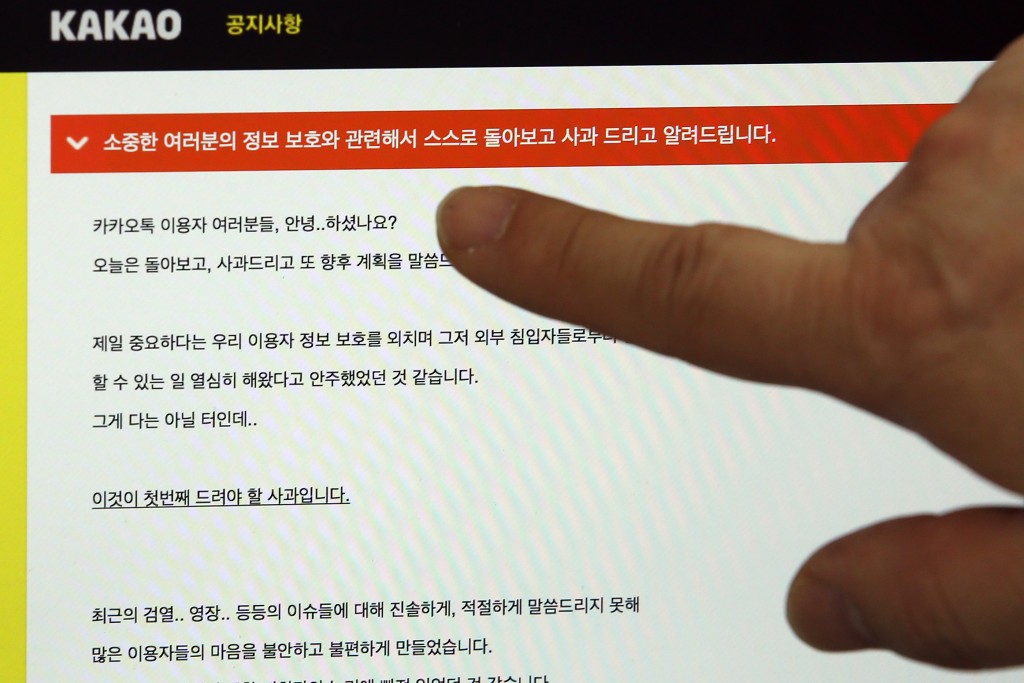- California Assembly OKs highest minimum wage in nation
- S. Korea unveils first graphic cigarette warnings
- US joins with South Korea, Japan in bid to deter North Korea
- LPGA golfer Chun In-gee finally back in action
- S. Korea won’t be top seed in final World Cup qualification round
- US men’s soccer misses 2nd straight Olympics
- US back on track in qualifying with 4-0 win over Guatemala
- High-intensity workout injuries spawn cottage industry
- CDC expands range of Zika mosquitoes into parts of Northeast
- Who knew? ‘The Walking Dead’ is helping families connect
Kakao to offer ‘privacy mode’ amid gov’t monitoring fears
By Yoon Sung-won
Daum Kakao said Wednesday it will introduce a stronger privacy protection feature in its app by the end of the year. The move comes as a countermeasure to prevent more subscribers from leaving KakaoTalk amid privacy concerns triggered by the news that its user data was under the authorities’ scrutiny.
The company apologized to its customers saying, “We are deeply sorry for causing confusion and anxiety with our service. We will take every possible measure to prioritize the protection of user information in the future.”
Daum Kakao said the new “privacy mode” will allow users to delete confirmed messages and have secret one-on-one conversations using new technology called “end-to-end encryption.”
It also explained this new mode will fundamentally make it impossible for the authorities to inspect conversations from the server, with or without a warrant.
The amount of days that conversations are stored on its servers has also been reduced to a maximum of three days, down from seven, starting today.
KakaoTalk has been embroiled in controversy after Rep. Jung Jin-woo of the small opposition Labor Party revealed that the prosecution recently examined his KakaoTalk conversations with 3,000 acquaintances who gathered at a rally to demand a probe into the Sewol ferry disaster near the President’s office.
Added to a previous announcement by the prosecution that it will strengthen real-time censorship on cyberspace, the news made Korean users to migrate to the German-based service Telegram, which its developers claim guarantees more heavily-encrypted and safer conversations.
The company admitted Wednesday that a total of 147 cases of conversation monitoring were requested by the government, adding that all the requests were accompanied with a warrant.
Meanwhile, Telegram, a German mobile instant messenger application, is reaping the benefits from the scandal. The company has experienced a surging inflow of Korean subscribers seeking a safer and more private service free from cyber censorship by the government.
An official at the Berlin-based Telegram said on Tuesday, “Over 1.5 million new South Korean subscribers downloaded and registered for the application last week,” which added to its more than 50 million users around the world as of September.
It also ranked at the top of the popular free apps list on Apple’s Appstore in Korea and 12th place on Google’s Play app market as of Wednesday.
Telegram is a mobile instant-messenger application built by Russian brothers Pavel and Nikolai Durov, who were protesting against censorship by the Russian government.
Since its launch in August last year, Telegram has claimed the messages on the app are “heavily encrypted and can self-destruct.” It also said its servers are spread worldwide to make it safer from hacker attacks. All these mean that it will be far more difficult for the Korean authorities to track and snoop into private conversations on Telegram.
“We have not shared our users’ private information with a third party so far,” a Telegram official said.
On Tuesday, it launched an updated version of Telegram app that supports Korean language.
KakaoTalk saw the number of its users decreased last week. This fueled the suspect that the “cyber exile” may be actually happening.
According to data by Rankey.com, an online market researcher, Tuesday, the average number of daily users of KakaoTalk was about 26 million last week, down 1.8 percent from a week earlier.
KakaoTalk’s lead in the domestic market has remained undisturbed in recent years despite continuous challenges by other services such as Naver’s Line and Whatsapp, the world’s biggest mobile instant messenger.
















